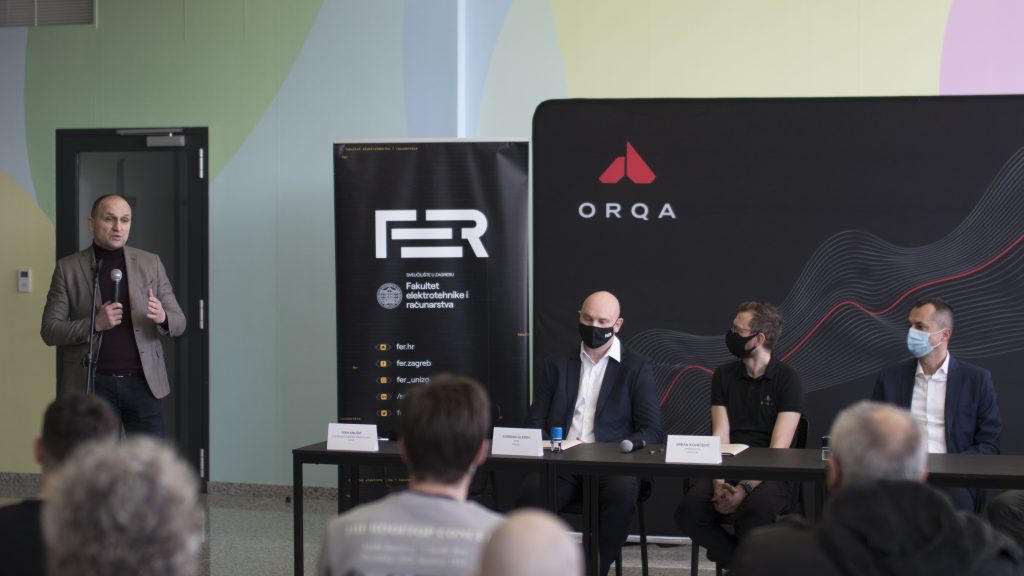Complex chip design such as this hasn’t existed in the Republic of Croatia so far, and it is on the basis of an initiative through which the rapidly-growing Osijek company Orqa d.o.o. further seeks to advance first-person (FPV) and remote reality (RR) technologies.
The goal of the Memorandum of Understanding signed by Orqa, the Faculty of Electrical Engineering, Computing and Information Technology in Osijek and Faculty of Electrical Engineering and Computing in Zagreb, is the joint work of experts, engineers and academia on research and development of technologies of strategic importance for digital and a more resilient European Union (EU).
As such, for the implementation of this initiative, the signatories of the Agreement will also promote a key strategic instrument for the implementation of the EU industrial strategy – Important Projects of Common European Interest (IPCEI).
“We intend to design a chip specialising in unmanned systems such as drones, vehicles or vessels, with the ability to upgrade to autonomous functionalities. This extremely complex project is the first project of this type in all of Croatia, we’re among the first in the world, and currently there aren’t enough engineering capacities for such a design.
Although this sort of staff is currently lacking here in Croatia, through this project we’re trying to build capacities and train engineers in order to start the development of the chip design ecosystem in Croatia in accordance with global trends. Cooperation with faculties as staff generators plays a key role in this. Through this project, we intend to achieve a symbiosis of commercial needs on the one hand, and academic knowledge and research on the other. In addition to the aforementioned faculties, the support of the Ministry of Regional Development and EU funds is extremely important for us in order to pave the way for the further development of this attractive industry,” said Srdjan Kovacevic, co-owner and CEO of the Osijek company Orqa.
As a world leader in the development of video glasses for drone pilots and as a leading regional company in the drone industry, Orqa is rightly considered a leader in Croatian modern technology and innovation. This isn’t a surprisie at all when one considers the research, development, and prototyping of devices in the field of first-person view (FPV) technology, remote reality (RR), video signal transmission and radio communication, and the production of electronic components and devices the company engages in – the most famous of which are video goggles for FPV drone pilots. Collaboration with STEM studios is a great opportunity both for young engineering hopefuls and for the entire technology sector. The signed Agreement is unique on the territory of the Republic of Croatia, and with it the City of Osijek and Osijek-Baranja County will be more strongly positioned in the demanding IT world.
“This agreement will further strengthen the cooperation between the two leading Croatian faculties in the field of chip design, to which the Osijek company Orqa is adding additional value. Here in Croatia, the development of the semiconductor industry is lagging behind other branches of electrical engineering, and the planned scientific research activities in cooperation with the economy will represent a significant step towards the development of microelectronics in this country. The implementation of scientific research will ensure the transfer of the latest knowledge in the economy, but also in study programmes, which will provide domestic students with additional competencies necessary for the labour market in this area,” said Tomislav Matic, the Dean of FERIT.
In addition to FERIT, the great potential of the Osijek company Orqa was also recognised by the Faculty of Electrical Engineering and Computing from Zagreb, which has long been positioned as one of the leading Croatian educational institutions in the STEM field.
“FER is committed to an economy based on knowledge, innovation and openness to global talent. The strength of any economy lies in the high-tech sector whose progress and competitiveness is impossible without knowledge and scientific research where the academic community plays an extremely important role. This agreement created the basis for the further development of Croatian competencies in the field of chip design and verification. The agreement is also key to connecting the Croatian academic community and the Croatian economy with major European players in the semiconductor industry and ultimately creating a consortium to apply under the Important Common European Interest (VPZEI) mechanism,” said Gordan Gledec, FER’s Dean.
For more, check out Made in Croatia.









